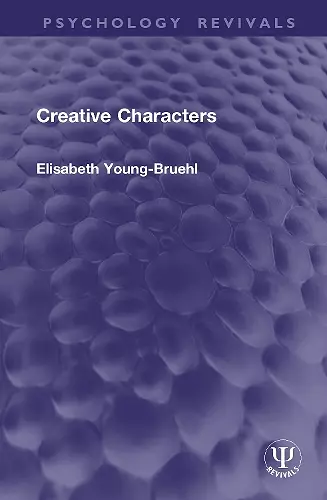Creative Characters
Format:Hardback
Publisher:Taylor & Francis Ltd
Published:1st Sep '25
£89.99
Supplier delay - available to order, but may take longer than usual.

The study of creativity is as old as western thought. In recent times any crisis of confidence is likely to involve anxiety about the loss of creativity – scientific, artistic, technological – and to set off a new search for creativity’s definition.
In Creative Characters, originally published in 1991, Elisabeth Young-Bruehl reflects on the long search for an understanding of creativity and offers a novel approach. She notes that studies of creativity fall into types. Some look at the act of creation, others focus on the creators, while others stress the conscious or unconscious motivations of creative people. All these approaches share certain limitations. They lack an integrative perspective and they search for a common denominator – one definition of the creative process, a single creative type – which obscures the diversity of creative people and their work.
Young-Bruehl here offers an original analysis of creativity based on a theory of character. Creative people, she argues, create in the medium of their characters. They develop (usually unconsciously) an image of their characters or, in other terms, an ideal for the organization of their minds and lives, which they both aspire to and project into whatever they create. This character-ideal appears in their works, their social visions, their philosophies of nature, and also their understandings of creative processes, their own and others’. What creative people wish for themselves, is what they wish for in their lives and works.
Young-Bruehl suggests that there are three broad character and creative types, each comprised of many variations. She displays these ways of getting one’s psychic act together or getting a product together by turning to three ancient Greek theorists of creativity – Plato, Aristotle, and Zeno – and three modern theorists – Nietzsche, Freud, and Proust. She then proceeds by clustering biographical vignettes and portraits of ideas in which she can show – rather than try to define – the creativity as well as the character ideal she has in mind.
Of special interest to Young-Bruehl is what individuals say about their own creativity, especially when creativity is not explicitly their topic. Her approach is primarily psychoanalytic, but she also uses philosophical analysis, literary criticism, history of science, and biography.
Psychoanalysts and psychologists will find the book not only a new approach to creativity,...
ISBN: 9781041086611
Dimensions: unknown
Weight: 670g
274 pages